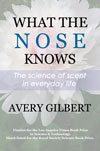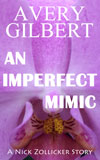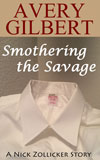
In keeping with the darkening mood of October and the approach of Halloween I recently embarked on a survey of smelly phantasms in literature.
My reasoning was simple:
Smells are haunting in more ways than one: they are invisible, they sneak up on you, and they can disappear quickly. Smells go hand in glove with faded memories, lost love, fear, anxiety, and unfulfillable yearnings.Because smells seem ready-made for ghost stories I anticipated an extended ride on the spectral tour bus, with stops at all kinds of overlooked and long-forgotten fictional destinations. Indeed, thing began well. There was the sweet fragrance of mignonette, a ghostly reminder of unfulfilled love from Bret Harte’s A Newport Romance. Then there was the telltale Parfum Mimosa which announced one of a pair of dueling ghosts in Dorothy Macardle’s The Uninvited. I was on a roll.
Accordingly, I opened The Haunted Hotel with anticipation, having seen this Victorian-era novel by Wilkie Collins cited as a fine example of a smelly ghost story. Alas! (as the Victorians were fond of saying) I was disappointed. It’s a rather stiff story, full of Lord So-and-So and Lady Such-and-Such, and who’s where in line for this or that hereditary title. There’s a love story of sorts, conducted mostly with shy feminine glances and repeated declarations of manly devotion, in the manner of Dudley Do-Right. The starchy characters are matched by a labored writing style. Adding to the tedium, some chapters begin shortly before the last one left off. This artifact of the novel’s original publication in serialized form is the 19th century version of “Last week on 24 . . .”
The Haunted Hotel is really a whodunnit. The cadaverous-looking, overly-dramatic and barely coherent Countess Narona marries a British peer who soon falls ill and dies while staying at an old palazzo in Venice. The circumstances are fishy: Lord Montbarry had taken out a life insurance policy that would pay off big time for his new bride. She herself is an exotic Eastern European with a questionable resume. Her brother, the Baron Rivar, is a notorious gambler and amateur chemist.
What give the story it’s feeble claim on the supernatural are the bad dreams had by Montbarry’s kin when they sleep in the room where he died—the palazzo having since been made over into a hotel. Then there’s the smell:
He became conscious of a mysteriously offensive odour in the room, entirely new in his experience of revolting smells. It was composed (if such a thing could be) of two mingling exhalations, which were separately-discoverable exhalations nevertheless. This strange blending of odors consisted of something faintly and unpleasantly aromatic, mixed with another underlying smell, so unutterably sickening that he threw open the window, and put his head out into the fresh air, unable to endure the horribly infected atmosphere for a moment longer.It turns out this double-barreled smell [yes here’s the obligatory spoiler alert, although no one without a lot of time on his hands and a high boredom threshold will seek out this particular volume] was that of a chemically preserved corpse stashed in a hidden crawl space in the hotel. In other words, the smell is a foreshadowing clue in a whodunnit and not an other-worldly message at all.
Boo. What a bummer.
So much for this stop on the olfactory ghost tour. Time to climb back on the bus and hope for better luck next time. Anybody have any gum?




2 comments:
I believe you are so close to the truth of ghost and haunting phenomenon! If you were a hyperosmic, and what is known as a sensitive in folklore, as I am, you would realize that all true hauntings have a distinct scent and that scent is what triggers an ancient mechanism which causes us to react the way we do! I am not alone in my perception and others have noticed this as well. (Psychics, ghost hunters, etc.)The difference is they have not spent years of their lives investigating the multiple scientific disciplines necessary to explain the rest of the story and they fail to realize that the scents are not phantom odors they are very real. Yet, even when they drop below our recognition threshold we still have a psycho-physiological reaction to them that triggers the whole haunting cascade. In addition, they are unable to understand that there is no connection between a spirit and a ghost, and that the ghost is caused by our ability to detect that which remains in the environment. Once we detect the trigger, which is caused by conspecific biological contamination the ghost becomes everything that we assign to it due to our personal beliefs and cultural conditioning. I would be very interested in discussing this with you at length, and getting your thoughts on the matter.
For almost 20 years, I experienced the smell of baking - bread, cookies, chocolate, etc. - in the wee hours of the morning. Finally, when we were doing some remodeling in our 100-plus year home home and the aromas became more frequent, I did some research on olfactory haunting. I'm not sure what to believe...
Post a Comment